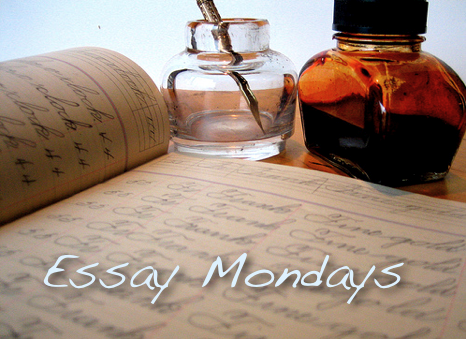
(Each week I read four essays from Philip Lopate's anthology The Art of the Personal Essay, and write about the one I find the most compelling.)
Interestingly, my four essay selections for this week all explored the lighter side of the form, which, considering the heaviness of The Waves and the fact that I'm in the midst of preparing for a big event, came as a welcome change. It's difficult to choose among the four frothy concoctions Lopate dished out; they're all delightful, from Max Beerbohm's lovable grump about why he never, of his own volition, chooses to go out for a walk, and the same author's meditation on that wonderful kind of laughter that gathers so much steam as to be self-sustaining; to G.K. Chesterton's gentler yet slightly more substantive pleas for cultivating a romantic appreciation of life's inconveniences ("On Running After One's Hat").
I think the one I'll write about, though, is Chesterton's "A Piece of Chalk," in which the author takes us on a light ramble in the undulating hills of English countryside, his coat pocket stuffed with colored chalks and brown paper with which he hopes to while away some time making drawings.
Do not, for heaven's sake, imagine I was going to sketch from Nature. I was going to draw devils and seraphim, and blind old gods that men worshipped before the dawn of right, and saints in robes of angry crimson, and seas of strange green, and all the sacred or monstrous symbols that look so well in bright colors on brown paper. They are much better worth drawing than Nature; also they are much easier to draw. When a cow came slouching by in the field next to me, a mere artist might have drawn it; but I always get wrong in the hind legs of quadrupeds. So I drew the soul of the cow; which I saw there plainly walking before me in the sunlight; and the soul was all purple and silver, and had seven horns and the mystery that belongs to all the beasts.
Lopate likens Chesterton's gentle, jovial tone to that of a "favorite uncle," and I think he's right on the money. I can understand why this essayist was so popular in his time: he is easy to spend time with; his prose is fluid and engaging; he is occasionally self-effacing (as in the "easier to draw" comment), but never annoyingly or compulsively so; he is quite religious, but with a broad, appreciationist type of religious morality that religious and non-religious readers alike could relate to. This last is particularly true of people reading Chesterton in his own time and context. To modern ears a few of his comments do seem a bit Christian-chauvinist, as above when he refers to pre-Christian times as "before the dawn of right." I found myself inclined to keep reading him despite this, however, because of the unexpected and appealing quality of his observations, and the way his light, conversational tone floats me along.
All this I said (in an off-hand way) to the old woman; and I put the brown paper in my pocket along with the chalks, and possibly other things. I suppose every one must have reflected how primeval and how poetical are the things that one carries in one's pocket; the pocket-knife, for instance, the type of all human tools, the infant of the sword. Once I planned to write a book of poems entirely about the things in my pocket. But I found it would be too long; and the age of the great epics is past.
I wouldn't say Chesterton blew my mind, but he was a highly enjoyable way to spend an hour or so, and I have to admire his technique: such lightness of touch is always surprisingly difficult to achieve.
Next week: Two great essays by (of all people) Virginia Woolf, and one long piece by George Orwell. After that we're leaving Britain, my friends.
Badge photo courtesy of Liz West:

